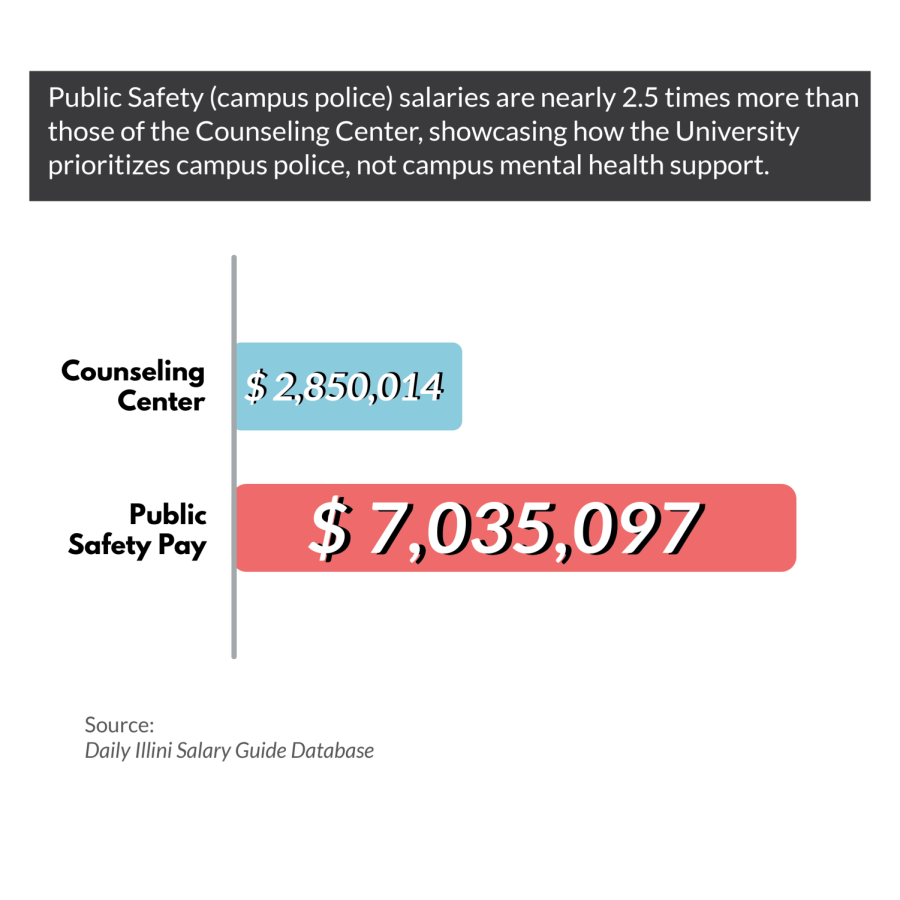Opinion | Match Counseling Center’s pay to UI Police
November 24, 2021
As revealed in The Daily Illini’s updated salary guide, the University’s Counseling Center receives about half the compensation the University of Illinois Police Department enjoys. With the Public Safety division featuring a staff nearly double the Counseling Center’s, this year’s salary guide uncovers the University’s misguided, outdated focus with policing rather than supporting mental health services.
Correspondingly, the University’s notoriously messy management of the Counseling Center has paved the way for a dramatic pay difference between it and campus Public Safety. This unequal, unacceptable treatment of the Counseling Center reflects the University failing to prioritize the mental health and stability of its students.
The University’s Counseling Center deserves equal — if not superior — compensation and consideration to campus police. While Public Safety is comfortably funded with salaries totaling around $7 million, the Counseling Center struggles with handling a campus of over 50,000 collecting, in contrast, about $2.8 million in salaries.
Although measures like reallocating 25% of funding from UIPD toward other resources overwhelmingly passed this last spring, no other movements to support the Counseling Center are in progress.
Without any other action, the disturbing status quo continues where the University upholds policing instead of mental health as a top priority for students.
Get The Daily Illini in your inbox!
It’s no secret the Counseling Center is a common source of complaints, yet the critiques are of no help when it’s understaffed and underpaid in comparison to the lavishly equipped Public Safety. Possessing around 45 salaried employees to Public Safety’s approximate 95, there’s little opportunity for the Counseling Center to adequately address the campus’ mental health mess.
Especially during unprecedented times, declining to offer better funding for the Counseling Center is senseless to countless students who wish for help.
This semester at the University of North Carolina at Chapel Hill, the rise in student suicides have shown the immense stress students face with the pandemic, a shaky economy and an intense return to in-person classes. Moreover, the Centers for Disease Control and Prevention state in a 2020 survey that roughly 25% of 18-to-24-year-olds “had seriously considered suicide.”
As Samantha Meltzer-Brody, chair of the department of psychiatry at UNC acknowledged in The Washington Post’s coverage, these campus mental health crises epitomize the larger dilemma at hand for a mentally struggling nation. Meltzer-Brody also contended “the needs are massive” to properly alleviate students’ stress.
Consequently, the University only contributes to this turmoil by inadequately funding mental health services. As Meltzer-Brody notes how “massive” efforts must be, the University of Illinois System’s $6.7 billion budget can surely improve the $2.8 million in salaries the Counseling Center receives.
It’s not an “either/or” matter when comparing UIPD and the Counseling Center. Advocating for better mental health services doesn’t mean Public Safety salaries must be transferred. Rather, there’s enough wiggle room with University salaries to give the Counseling Center equal footing or, ideally, a better budget than Public Safety.
To satisfy “public safety,” mental health must be emphasized. With the present salary distribution showing the University’s disproportionate focus on public safety, students’ mental health is financially seen as insignificant.
Both aforementioned services are designed to assist over 50,000 students. Furthermore, while one enjoys salaries amounting to more than $7 million and nearly 95 employees, one’s destined to fail with about half the staff and salaries.
If one believes there’s little difference between $7 million and $2.8 million, I ask you to compare each service’s website. UIPD’s website features a “Services” tab of nine resources to thoroughly examine and utilize; the Counseling Center’s home page is not as refined, nor does it offer a plethora of resources — instead periodic “self-help” information is supplied in addition to appointments or emergency tools.
Matching the Counseling Center’s pay and employees with Public Safety is the first step toward addressing this protracted predicament. Nevertheless, if the University earnestly desires to boost mental health, it must put its money where its mouth is.
Nathaniel is a junior in LAS.







